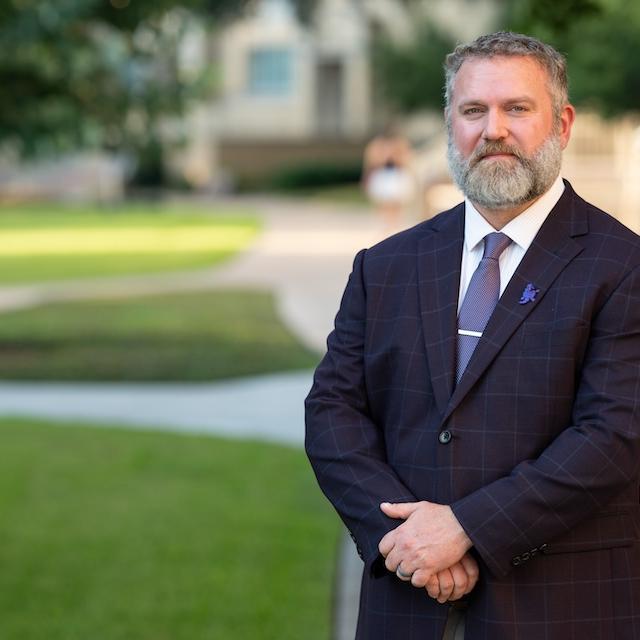
Reuben Burch: Leading Texas Christian University to R1
If Reuben Burch had been a quarterback in college, the Office of Research & Creative Activity he has been tasked with expanding at Texas Christian University might be different.
But Burch played fullback at Mississippi State University, and that position makes all the difference.
“The office of research is going to be focused on strategizing, shaping and serving our faculty and students,” Burch said. “That’s exactly what a fullback used to do in the late 1990s, early 2000s — gets in front, takes a beating and gets our talented teammates to where they need to go, making sure they are successful.”
Research is a priority for TCU Chancellor Daniel W. Pullin and a core pillar in the university’s Strategic Plan, LEAD ON: Values in Action. Burch was tapped as vice provost for research to provide vision, direction and strategic planning to increase research funding and scholarly productivity in support of the university’s national research agenda and goals.
The goal line for Burch: TCU achieving the Carnegie Classification of a Research 1 higher education institution … and sooner rather than later.
“This is about harnessing the power of our talented professors, researchers, scientists and incredible students here at TCU to help solve some of the biggest problems facing our communities,” Pullin said. “Dr. Burch is a doer, and he has a clear vision of how to best proceed in this new era for research and creative activity in higher education.”
Three things you learn quickly when talking to Burch: He is a builder. He is a good teammate. And he has a game plan.
1. He’s a builder.
Burch has been on campus for less than three months and has already moved the ball forward. As this article is being published, he is in Melbourne, Australia, establishing an international research partnership with Deakin University — the No. 1 institution in the world for sports science — empowering TCU to further grow into this human-centered research space. On the second day of the job, he began partnering with TCU’s Information Technology leadership to address campus artifical intelligence for all faculty and students.
And those are just the projects he can openly discuss right now. In addition, he has already expanded the research office by 33% and is using his industrial engineering background to standardize processes.
“We have to remember to keep the main thing the main thing; this means telling our story and leaning into the fact that we are already world-class in teaching. We now must ensure we retain that identity while building out the research side to become R1 as well,” Burch said. “R1 the right way.”
These are bold goals in uncertain times. The financial landscape of higher education is shifting, from the dramatic change in collegiate athletics after the House v. NCAA ruling to the even more dramatic changes in federal funding for university research and development. Shifting political priorities and big budget cuts to the National Science Foundation, National Institutes of Health, the Department of Energy and other agencies have meant the typical path to building a thriving, sustainable research program is now different and requires even more funding diversity.
“We have to acknowledge that in 2025, the research model is drastically different, and with that drastic difference comes an opportunity,” Burch said. “There is a lot happening nationally in terms of research and creativity funding. So there is an opportunity for TCU to build a new strategy that is sustainable, to build it right, to build research and creative activity enterprise correctly. … This is truly an opportunity to build a program from scratch.”
That is three “opportunities” and four “builds” in one paragraph, if you are counting.
You will hear Burch say both of those words a lot because if chaos is a ladder, sea change offers opportunity — opportunity to step back and ask questions: What is working? What is not? If you had a chance to build from scratch, what would it look like?
After college, Burch contracted for government entities like the U.S. Navy and NASA and companies like FedEx Express before returning to Mississippi State to do, well, a lot. His bio includes associate vice president for research, executive director of the Athlete Engineering Institute, associate professor of industrial systems and engineering and Jack Hatcher Endowed Chair for Engineering Entrepreneurship. His resume pales in comparison to the successful programs — like the Athlete Engineering Institute and AiM UP (Advancements in Manufacturing Upskilling Program) — that he created from the ground up.
What Burch learned from those builds informs a lot of what he is weaving into the foundation of TCU’s research enterprise: collaborate, collaborate, collaborate. Secure competitive funding. Measure what we currently do well. Manage priorities. Make it sustainable.
“Reuben was a perfect fit for what we are doing here at TCU,” said Floyd Wormley, provost and vice chancellor for Academic Affairs. “He has a proven track record of fostering a culture of innovation and bringing together expertise from various fields to address complex problems and develop comprehensively applied solutions.”
2. He is a good teammate.
Burch talked extensively with Pullin during the interview process and discovered how much they have in common. Both are dynamic, entrepreneurial-minded leaders with experience in industry and higher education. They look at complex problems and see opportunity.
Change does not shut them down. It lights them up.
“For him to have a history of entrepreneurship as a chancellor, I think you are going
to find a lot of other universities are going to be looking for that skill, too,”
Burch said. “Being able to pivot quickly and not panic, that’s invaluable in this
climate. One of my dearest mentors and friends taught me that: pivot, don’t panic.
He’s more right now than ever.”
Pullin and Burch share something else: They both left a place they loved for TCU.
Pullin graduated from the University of Oklahoma twice (undergraduate and law school)
and spent most of his higher-ed career there. After earning his degree in computer
engineering, Burch also obtained his Ph.D. in industrial and systems engineering.
He then returned to his alma mater after a few years in industry to start over as
an assistant professor. There he stayed, making marked contributions to a place he
cared for greatly.
“I really appreciated Chancellor Pullin’s first question, ‘Are you ready to leave your alma mater?’ Because that’s hard,” Burch said. “He was able to speak to how hard it was for him, but how it was also a necessary step for him. That really resonated with me.”
What they both saw in TCU was a sleeping giant and an opportunity to build (yes, that word again) what the future is going to require from higher education and research enterprises. They also feel good because of the teams they have assembled.
“That’s leadership,” Burch said, “empowering your team to do things the way that they know is best while providing them the tools they need and getting out of the way. That’s how your entire organization gets better.”
3. He has a game plan.
The goals are different, of course, in athletics and research. R1 is not a national championship, nor can it be achieved in a single season. What both do require is building a team, creating a game plan and a relentless day-to-day pursuit of the goal.
“I appreciate building the plane while we are flying in it. I don’t know that I know any different,” Burch said. “If you have a chance to build a program from ground zero, how would you do it? And what would you do differently based on lessons learned? And that was just too attractive an opportunity to pass up.”
In his mind, there has never been a better time to be at TCU. Thanks in part to the Strategic Plan, talented faculty are already doing innovative work in their fields.
And after the College Football National Championship run from a few years ago, many people are looking more closely at TCU.
“It’s the Flutie Effect. It’s the concept that you can use the visibility of sports to bring together a community and, in our case, a research community, simply because now people are more aware and they are curious,” Burch said. “So, we can jump on that curiosity and show them we are competitive in the areas you see on ESPN and competitive in a lot of areas you don’t see.”
Burch was asked to finish the sentence: “I will be successful at TCU if …”
“There is a lot to unpack there,” he said. “I’d rather say ‘we.’ We’ll all be successful at TCU if we can create a research office built on service. A friend of mine who’s a former NFL coach reminded me recently that in the ’90s, we used to have a saying: ‘In fullbacks we trust.’ I want to earn the trust of the faculty here at TCU, and the best way to do that is to make clear I am here to serve them.”
